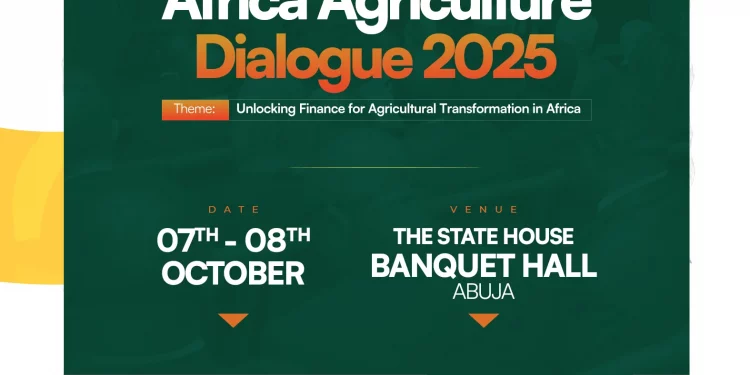Nigeria will host the Africa Agriculture Dialogue (AAD) 2025 in Abuja on October 7 and 8, as the Federal Government intensifies efforts to boost the agricultural sector at home and across the continent.
The high-level continental forum, themed “Unlocking Finance for Agricultural Transformation in Africa,” will hold at the State House Banquet Hall. It is expected to attract senior government officials, agribusiness leaders, financial institutions, development partners, farmers, and innovators from across Africa.
The dialogue precedes the annual World Food Prize ceremony in the United States and aims to give Africa a unified platform to define its agricultural financing and investment priorities ahead of the global event.
Speaking at a virtual press briefing, Senior Special Assistant to the President on Livestock Development, Idris Ajimobi, and Special Adviser to the Minister of Livestock Development, Richard-Mark Mbaram, said the hosting underscores Nigeria’s commitment to agricultural transformation at both national and continental levels.
Ajimobi explained that the event will offer practical financing solutions to unlock Africa’s agricultural potential.
“Lack of financing remains a major constraint to agricultural growth across Africa. Hosting AAD 2025 gives stakeholders the opportunity to explore innovative financing models that can drive productivity and food security,” he said.
He added that the event aligns with ongoing reforms in Nigeria’s livestock sub-sector, which he described as a key pillar of food security, employment generation, and economic diversification.
Ajimobi highlighted the National Livestock Master Plan (N-LMP) as one of the Federal Government’s flagship frameworks. The five-year strategy, developed in collaboration with the Livestock Productivity and Resilience Support Project and international partners, aims to attract private and public investment into cattle, poultry, and small ruminant value chains.
“The N-LMP focuses on animal breeding, health services, improved market access, and investment incentives that can make the livestock industry more competitive and sustainable,” he said.
Mbaram described AAD as a strategic platform that shapes Africa’s agricultural narratives ahead of the World Food Prize, ensuring the continent’s priorities are reflected on the global stage.
“The dialogue captures and projects Africa’s agricultural stories, ensuring that the continent’s challenges, innovations, and ambitions are visible globally,” he stated.
He praised the Tinubu administration for backing its food security agenda with concrete policy actions.
“The declaration of a state of emergency on food security was a turning point. It showed the government’s commitment to building a secure and sustainable food system through decisive actions,” Mbaram said.
He also urged the media to shine more light on ongoing sector reforms that may not be widely publicised.
With expectations running high, AAD 2025 is set to become a key platform for shaping Africa’s agricultural financing landscape and reinforcing Nigeria’s leadership in driving food security and rural transformation across the continent.










